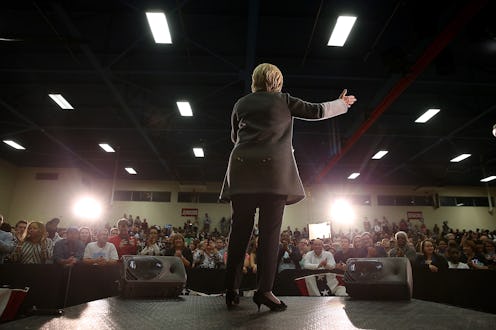News
And The Democratic Super Tuesday Winner Is...
The dust has settled, the votes have been counted, and the biggest voting day of the year so far is over. About a dozen and territories voted in the Democratic and Republican primaries on Super Tuesday, and while nobody delivered any knockout blows, the votes gave us a clearer picture of the race than we've had so far. The Democratic Super Tuesday winner was Hillary Clinton, because she preserved her existing lead throughout the country and prevented Bernie Sanders from pulling off any huge upsets. But this was a pretty narrow victory, because Sanders' performance was certainly nothing to sneeze at.
Things looked good for Clinton right off the bat, when MSNBC and other cable news outlets projected that she'd win Virginia and Georgia just seconds after the voting ended. This was based largely on exit polls, and the fact that the state was called so quickly implied that these exit polls were very heavily lopsided in favor of Clinton. Given the vastly different demographics of those two states, runaway Clinton victories in both suggests that she has a lot of support across a wide swath of the Democratic electorate.
As the night progressed, Clinton notched up victories in Alabama, Arkansas, Tennessee, and Texas. Combined with her earlier win in Georgia, this strongly indicated that Clinton's so-called "Super Tuesday firewall" — a collection of southern states that her campaign hoped would prevent Sanders from getting too close to the nomination — was indeed holding up.
But the night wasn't a complete burnout — Bernout? — for Sanders. Far from it. It's not just that he won his home state of Vermont, although he certainly did do that. Sanders also won the Oklahoma primary and the caucuses in Minnesota and Colorado, giving him a respectable four wins for the night. Between Tuesday and Wednesday, then, the number of Sanders victories increased fivefold, since he'd only won a single state (New Hampshire) beforehand.
I had doubted Sanders' chances on Super Tuesday, and I was proven wrong. Sanders' victories are important both because they win him delegates — we won't know exactly how many until all of the votes are counted — and because they give him and his supporters a much-needed psychological victory. Obviously, nominations are ultimately decided via delegates, not morale, but after Sanders' crushing defeats in Nevada and South Carolina, his campaign was in bad need of some sign that it wasn't completely toast.
However, Sanders' chances of winning the night were squashed when the results were announced in Massachusetts. This was the most delegate-heavy state that Sanders had a realistic chance of winning, but Clinton defeated him there by less than two percent. This was arguably the moment when Clinton, not Sanders, won the night. White liberals are supposed to be Sanders' biggest base of support, and if he can't win in heavily-white, heavily-liberal Massachusetts, where exactly can he win?
Clinton has reason to be happy after Super Tuesday, and not simply because she won more delegates than Sanders. Exit polls showed that Hillary did extremely well among black Democrats, and if she wants to reassemble the coalition that twice elected Barack Obama to the presidency, she's going to need high turnout among black voters. The same goes for Latino voters, and they went to Clinton 2:1 over Sanders on Super Tuesday, according to MSNBC. While primary results aren't necessarily an indicator of general election turnout, these numbers are, at the very least, a promising indicator that Clinton will be able to turn out the vote in November.
We've still got a long primary to go, and Sanders won more than enough delegates tonight to keep him in the game. But Hillary Clinton won the night, and she's still well on track to win the Democratic nomination for president.
